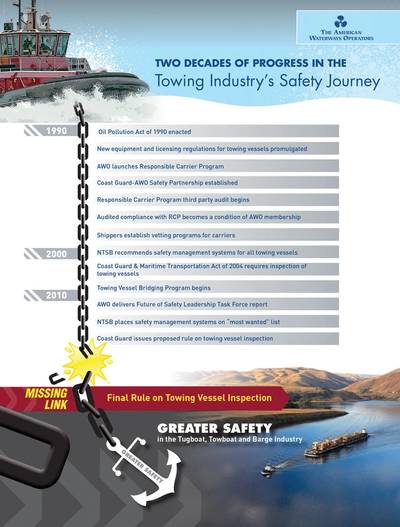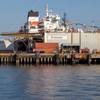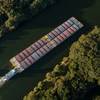It's Time for a Towing Vessel Inspection Rule
Last month, I had the opportunity to testify before the House Transportation and Infrastructure Subcommittee on Coast Guard and Maritime Transportation at a hearing that examined maritime regulations. In what must have been a change of pace for Subcommittee members, instead of detailing the regulatory burdens facing the tugboat, towboat and barge industry, I urged them to exercise their oversight responsibility to ensure expeditious publication of long-awaited U.S. Coast Guard regulations regarding towing vessel inspection.
Said very simply, we need to get the towing vessel inspection rule done, and done right, right away. These rules will advance our shared goals of improving safety, security and environmental stewardship and cap two decades of tremendous progress along the road to greater safety on our nation’s waterways.
We have waited much too long. Congress directed the Coast Guard to undertake the towing vessel inspection rulemaking more than nine years ago, in the Coast Guard and Maritime Transportation Act of 2004. Three years ago, frustrated by the slow pace of the rulemaking process, Congress set a statutory deadline of October 15, 2011, for issuance of a final rule – a deadline that passed nearly two years ago. Those facts alone create a cause for immediate action.
Equally compelling, however, is the opportunity that this rulemaking provides – an opportunity that we fail to seize each day that the rules continue on their slow course through the federal bureaucracy. The towing vessel inspection rulemaking offers a historic chance to take safety in the tugboat, towboat and barge industry to a new level, not unlike the transformation of the oil transportation industry after the Oil Pollution Act of 1990. This rulemaking will raise safety standards throughout the tugboat, towboat and barge industry, incorporating and building on the safeguards that quality companies have already put in place and ensuring that all vessels achieve a minimum threshold of safety that is necessary to protect lives, the environment and property.
Further, the towing vessel inspection rules are the missing link in a journey of a continuous improvement that began more than 20 years ago. The Coast Guard, Congress, and our customers have all been active partners in that journey, encouraging and demanding that the industry strive daily to achieve the goal of zero harm to human life, to the environment, and to property as we transport the nation’s waterborne commerce. The journey has been marked by private sector leadership, including the AWO Responsible Carrier Program, the Coast Guard-AWO Safety Partnership, and rigorous customer vetting of companies and vessels, to name just a few examples. It has also been characterized by responsible public policymaking, from OPA 90 to the 2004 law that gave rise to this rulemaking to the inclusive and thoughtful process by which the Coast Guard has engaged stakeholders throughout the development of the towing vessel inspection rules.
That journey has produced meaningful results. A 2012 Coast Guard Report to Congress credited the combination of private and public sector initiatives with producing a dramatic decline in oil spills from tank barges. However, we have not yet achieved our goal of zero harm. The most important step that we can take – the critical missing link in the safety chain – is publication of the towing vessel inspection rule.
There should be no tradeoff between getting the rule done promptly, and getting it done right. The Coast Guard has had nearly two years to review public comments on the October 2011 notice of proposed rulemaking, and many of those comments echo very similar themes. There is a nine-year history of work by the congressionally authorized Towing Safety Advisory Committee and a strong public docket filled with the technical information the Coast Guard needs to finalize this rulemaking. The regulated community is asking for this rule and bipartisan Members of Congress are calling for its publication.
We cannot afford further delays. We cannot afford to let sound public policy remain the victim of bureaucratic red tape. Two decades of progress are waiting to come to fruition. Now is the time to act.
(As published in the October 2013 edition of Marine News - www.marinelink.com)














